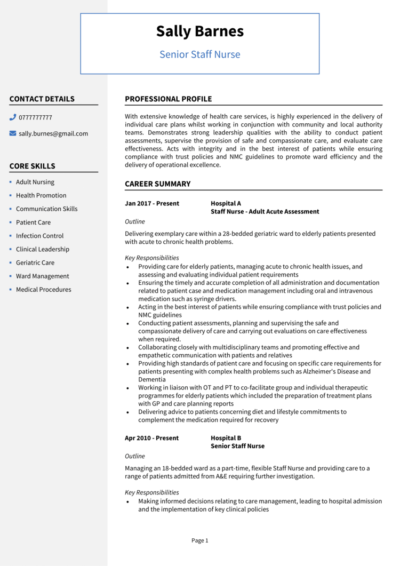As a nurse, you’ve got the compassion, dedication, and steady hands to care for patients in their most vulnerable moments. But before you can start making rounds, you’ll need a CV that shows recruiters you’re ready to step onto the ward.
This guide, packed with 11 interview-winning Nursing CV examples, will help you highlight your skills, showcase your experience, and secure the opportunity to deliver care where it’s needed most.
Senior Staff Nurse CV
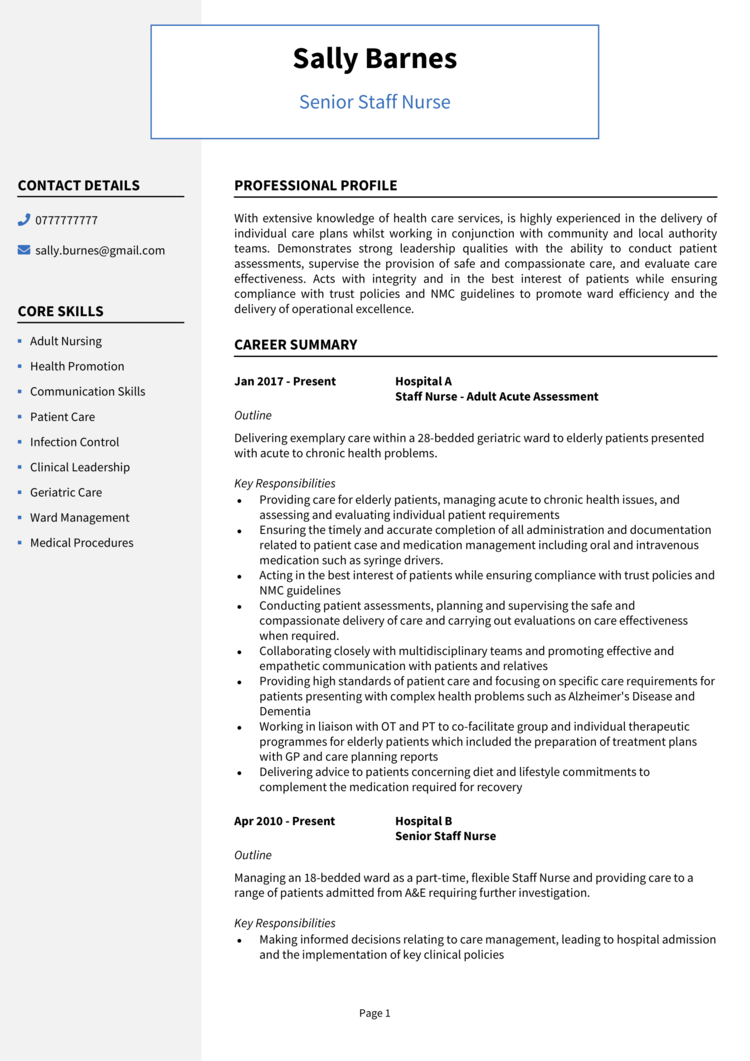
Surgical Nurse CV
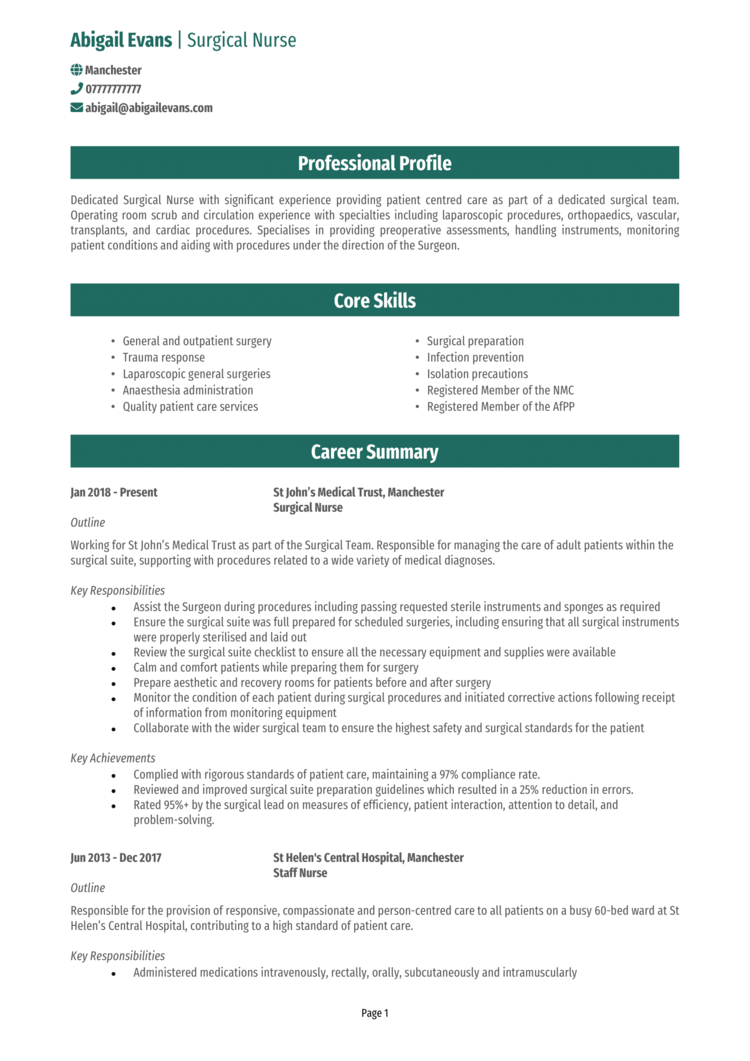
Student Nurse CV

Nurse Practitioner CV
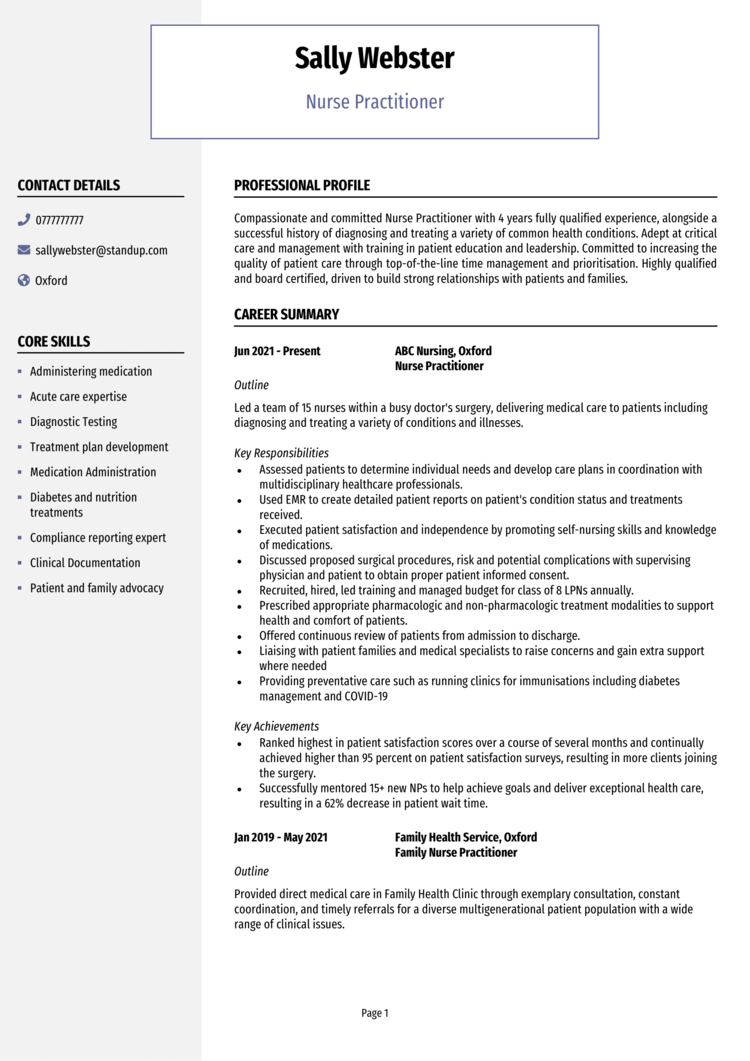
Registered Nurse CV

Staff Nurse CV
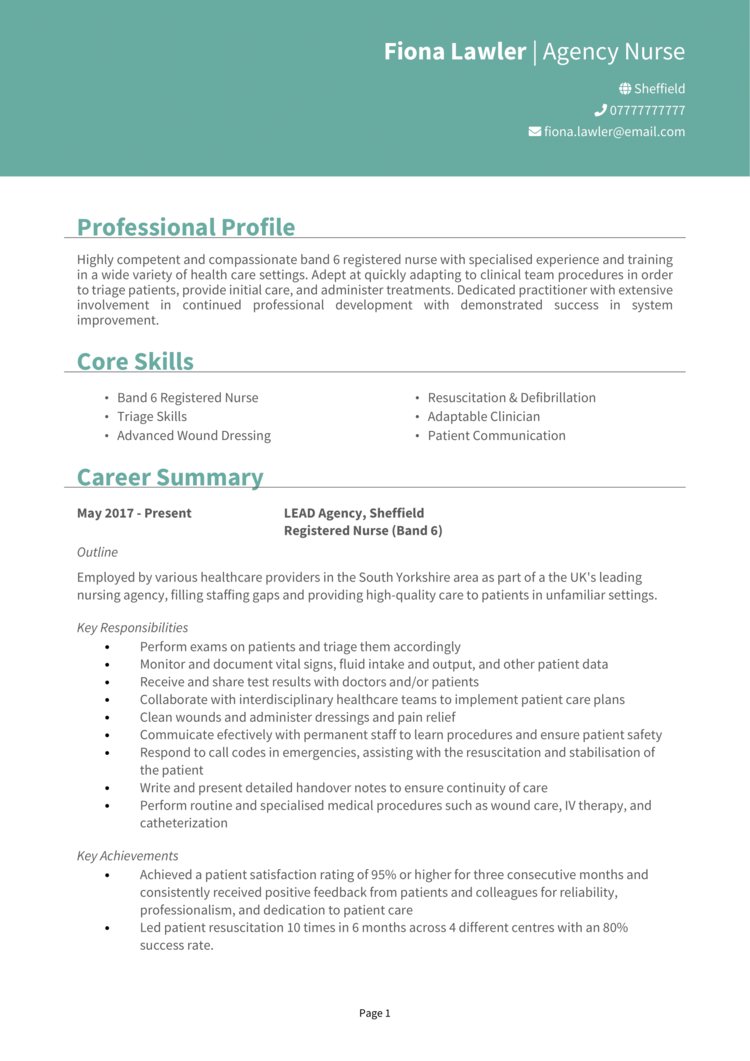
Nurse Manager CV

Occupational Health Nurse CV
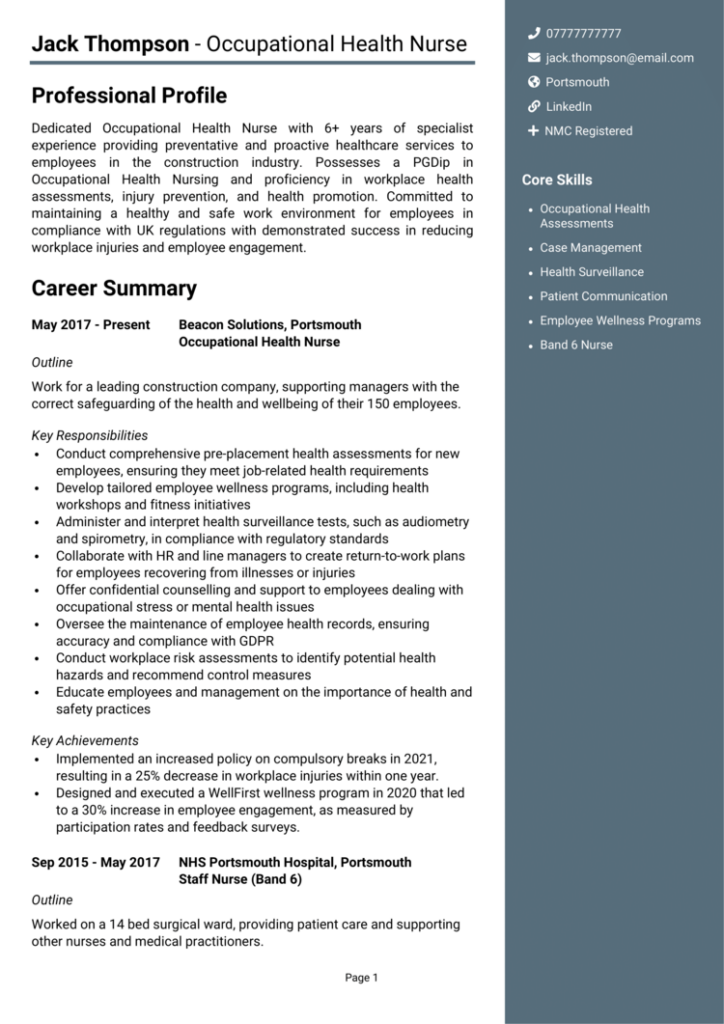
Neonatal Nurse CV
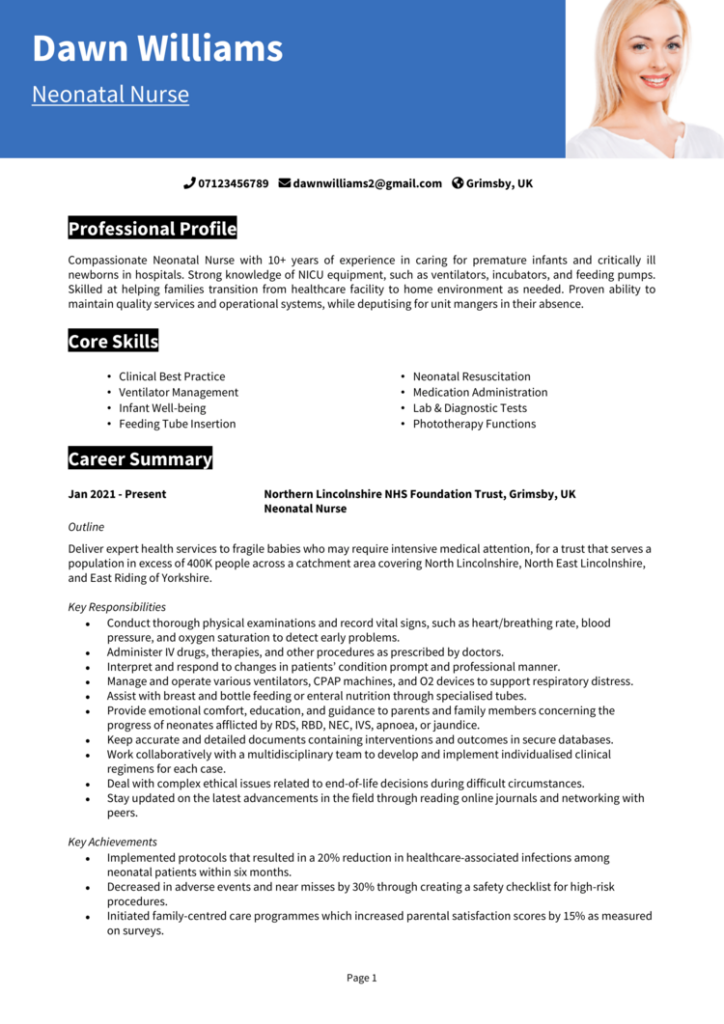
A&E Nurse CV
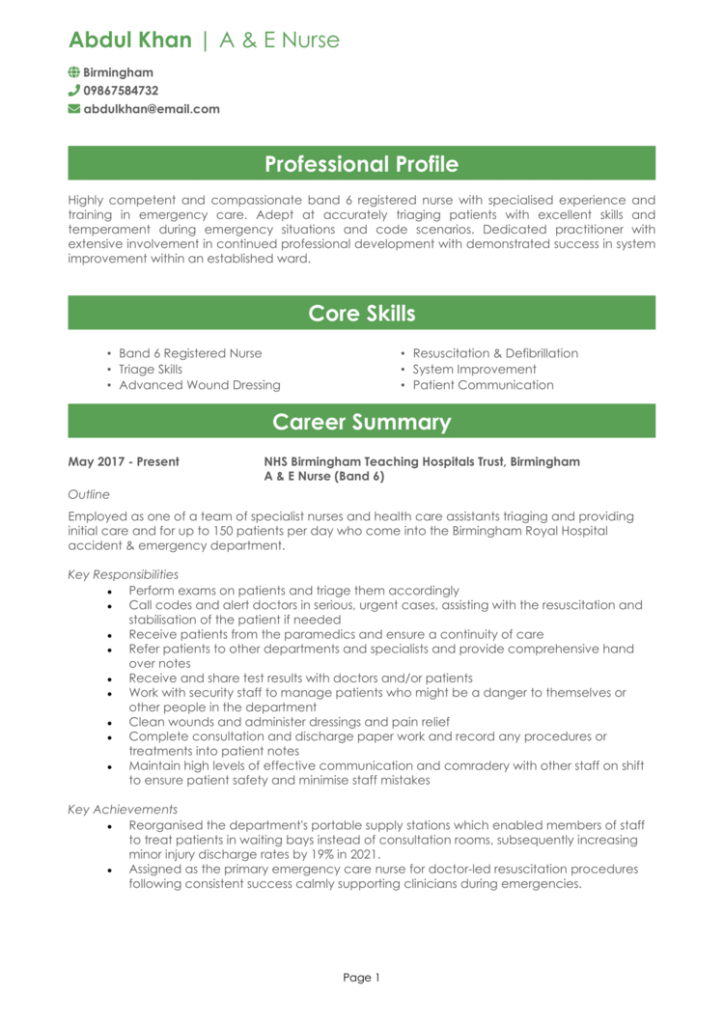
Critical Care Nurse CV
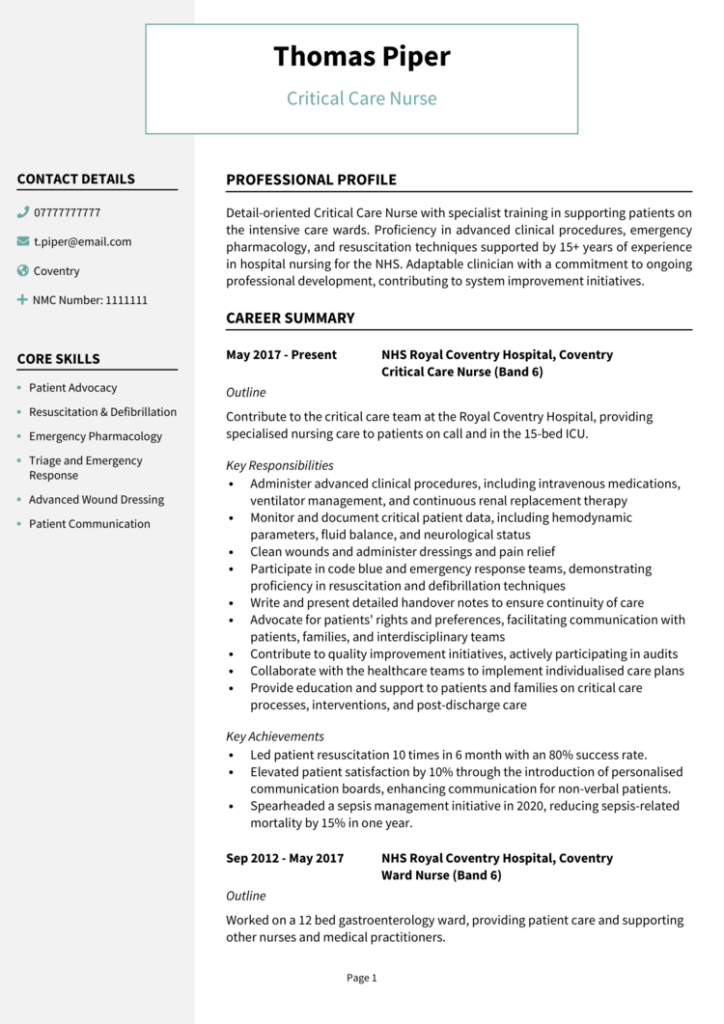
How to write your Nursing CV
Learn how to create your own interview-winning Nursing CV with this simple step-by-step guide.
A nurse’s CV is a reflection of your ability to handle high-pressure situations, support patients, and work effectively within a multidisciplinary team.
In this guide, you’ll learn how to write a CV that emphasises your clinical expertise, compassion, and ability to make a positive impact in healthcare settings.
Nursing CV structure


A well-structured Nursing CV is like a patient chart – it needs to be well-organised, easy to read, and free from any alarming red flags. Recruiters need to quickly see your qualifications, experience, and suitability for the role.
Here’s how to structure your Nursing CV:
- Name and contact details – List your personal details clearly at the top for easy visibility. Adding a photo is optional, but not required.
- Profile – Open with a concise summary of your nursing expertise, specialties, and commitment to patient care. Tell the recruiter what benefits you’ll bring to their company.
- Core skills – Highlight your competencies, such as administering medication or creating patient care plans. This is usually done with just a few bullet points.
- Work experience – Start with your most recent roles and focus on the value you brought to patients and teams.
- Education – List your nursing qualifications, certifications, and any specialised training.
- Additional info – There’s also the option to include hobbies and interests that show your passion for health and well-being.
Nursing CV format


Your CV should reflect the professionalism and attention to detail that you bring to nursing. Even the most experienced candidates can be overlooked if their CV is difficult to navigate or poorly presented due to simple mistakes.
Here’s how to format your Nursing CV:
- Bullet points – These make your responsibilities and accomplishments easy to scan, helping recruiters get to the good stuff quickly.
- Divide sections – Use clear headings and logical spacing to organise your information neatly.
- Use a clean font – Choose a professional font that’s easy to read, paired with a CV layout that feels organised and consistent.
- Keep it the right length – Limit your CV to no more than two pages. This is enough space to show your expertise without overwhelming the recruiter.
Nursing CV profile


Your profile is your CV’s introduction, where you demonstrate your clinical expertise and passion for patient care. At a quick glance, convey to the recruiter the value you’d provide if they hired you over anyone else.
Nursing CV profile examples
Profile 1
Dedicated Nurse with five years of experience in providing compassionate care in hospital settings, specialising in post-surgical recovery and patient education. Skilled in monitoring vital signs, administering medications, and collaborating with multidisciplinary teams to ensure quality care.
Profile 2
Reliable Agency Nurse with three years of experience working across various healthcare facilities, including hospitals, care homes, and clinics. Proficient in quickly adapting to new environments, managing patient care, and maintaining accurate records under pressure.
Profile 3
Experienced Senior Nurse with over eight years of expertise in leading nursing teams, managing complex cases, and mentoring junior staff. Skilled in patient assessment, critical care management, and implementing healthcare policies to improve operational efficiency and patient outcomes.
What to include in your Nursing CV profile
Here are some tips on what to include in your Nursing CV profile:
- Where you’ve worked – Specify which healthcare settings, such as hospitals, clinics, or care homes you’ve worked within before.
- Your top qualifications – Note degrees in nursing and additional certifications like BLS or ACLS.
- Key skills – It’s important to list abilities like patient monitoring, wound care, or team collaboration.
- Patient demographics – Reference the types of patients you’ve cared for, such as paediatrics, geriatrics, or surgical cases.
- Who you worked with – Mention the doctors or other specialists you worked alongside.
- Specialisations – Mention specific areas, such as oncology, ICU, or mental health nursing.
Core skills section


Your core skills section is a quick snapshot of your abilities, giving recruiters an overview of your clinical expertise and adaptability.
For nurses, this section should highlight both technical and interpersonal skills. Tailor these to the specific role and healthcare setting you’re applying for.
Finding it challenging to create a nursing CV?
Give our CV builder a try – it offers medical-specific content, easy-to-use templates, and expert guidance to help you stand out in healthcare.
Key skills that make a Nursing CV stand out
- Patient Care – Delivering compassionate and comprehensive care to meet individual needs.
- Medication Administration – Administering drugs accurately and monitoring patient responses.
- Health Assessments – Conducting vital sign checks, physical assessments, and triage.
- Wound Care – Managing dressings and monitoring healing progress.
- Patient Education – Teaching patients and families about post-care procedures and lifestyle changes.
- Team Collaboration – Working effectively with doctors, therapists, and other healthcare professionals.
- Record Keeping – Maintaining accurate and detailed patient records.
- Infection Control – Implementing protocols to prevent the spread of disease.
- Emergency Response – Acting swiftly and effectively during urgent medical situations.
- Specialist Knowledge – Expertise in specific areas, such as dialysis, neonatal care, or palliative care.
How to write a strong work experience section for your CV


Your work experience section is where you demonstrate your ability to provide exceptional care and manage clinical responsibilities. Highlight your key contributions, patient outcomes, and collaboration with teams.
List your roles in reverse chronological order, focusing on key responsibilities and measurable results.
If you’re just starting out, highlight placements or volunteer roles – every nurse has to start somewhere, and your compassion speaks louder than your job title.
Structuring your jobs

- Outline – Provide an overview of the healthcare facility, your role, and the types of patients you cared for.
- Responsibilities – Highlight tasks like patient care, medication administration, or team support. Use action verbs like “monitored,” “assisted,” or “administered.”
- Achievements – Showcase measurable results, such as improved patient satisfaction scores, successful management of complex cases, or compliance with healthcare standards. Include figures wherever possible to add impact.
Example jobs for Nursing
Nurse | City General Hospital
Outline
Provided high-quality nursing care in a busy hospital ward, focusing on patient recovery and well-being. Monitored health conditions and implemented care plans in collaboration with healthcare teams.
Responsibilities
- Administered medications and treatments in accordance with physicians’ instructions.
- Monitored patient progress, documenting observations and reporting any changes.
- Educated patients and families on post-discharge care and health management.
- Assisted in emergency situations, providing immediate care and support.
- Maintained compliance with infection control and safety standards.
Achievements
- Improved patient satisfaction scores by 15 percent through compassionate care and clear communication.
- Reduced medication errors by implementing a double-checking system for drug administration.
- Praised by supervisors for consistently maintaining accurate and detailed patient records.
Agency Nurse | CareFlex Staffing
Outline
Provided flexible nursing support across various healthcare facilities, adapting quickly to different patient needs and environments. Ensured continuity of care in understaffed settings.
Responsibilities
- Delivered patient care in hospitals, care homes, and clinics, covering a wide range of medical conditions.
- Administered treatments, managed wound care, and monitored vital signs.
- Collaborated with existing staff to ensure seamless patient handovers.
- Maintained compliance with facility-specific policies and procedures.
- Documented patient information accurately and ensured data protection standards.
Achievements
- Reduced patient wait times by 20 percent through efficient prioritisation of tasks.
- Consistently praised by facility staff for professionalism and adaptability.
- Received multiple reassignments due to reliability and high-quality care delivery.
Senior Nurse | Greenfield Care Centre
Outline
Led a nursing team in a care home, focusing on patient-centred care and staff development. Oversaw clinical operations and managed complex cases, ensuring high standards of care delivery.
Responsibilities
- Supervised a team of 15 nurses and care assistants, providing training and mentorship.
- Developed and implemented care plans for residents with chronic and acute conditions.
- Conducted regular audits to ensure compliance with health and safety regulations.
- Collaborated with families to address concerns and update care plans.
- Managed medication administration, ensuring accuracy and adherence to protocols.
Achievements
- Improved staff retention rates by 25 percent through enhanced training programmes.
- Reduced patient falls by 30 percent by introducing risk assessment tools.
- Recognised by management for successfully leading the team during CQC inspections.
Education and Qualifications


The education section is vital for nurses, as it demonstrates your clinical knowledge and commitment to ongoing learning. Include degrees in nursing, certifications, and relevant training courses.
List your qualifications in reverse chronological order, starting with the most recent.
Most valuable qualifications for Nurses
- Bachelor of Science in Nursing (BSN) – Comprehensive training in clinical and theoretical nursing practices.
- Registered Nurse (RN) License – Essential certification for practising as a nurse.
- Basic Life Support (BLS) Certification – Training in life-saving procedures like CPR.
- Advanced Cardiovascular Life Support (ACLS) Certification – Advanced training in emergency and critical care scenarios.
- Infection Prevention and Control Certification – Expertise in maintaining safe and hygienic healthcare environments.


